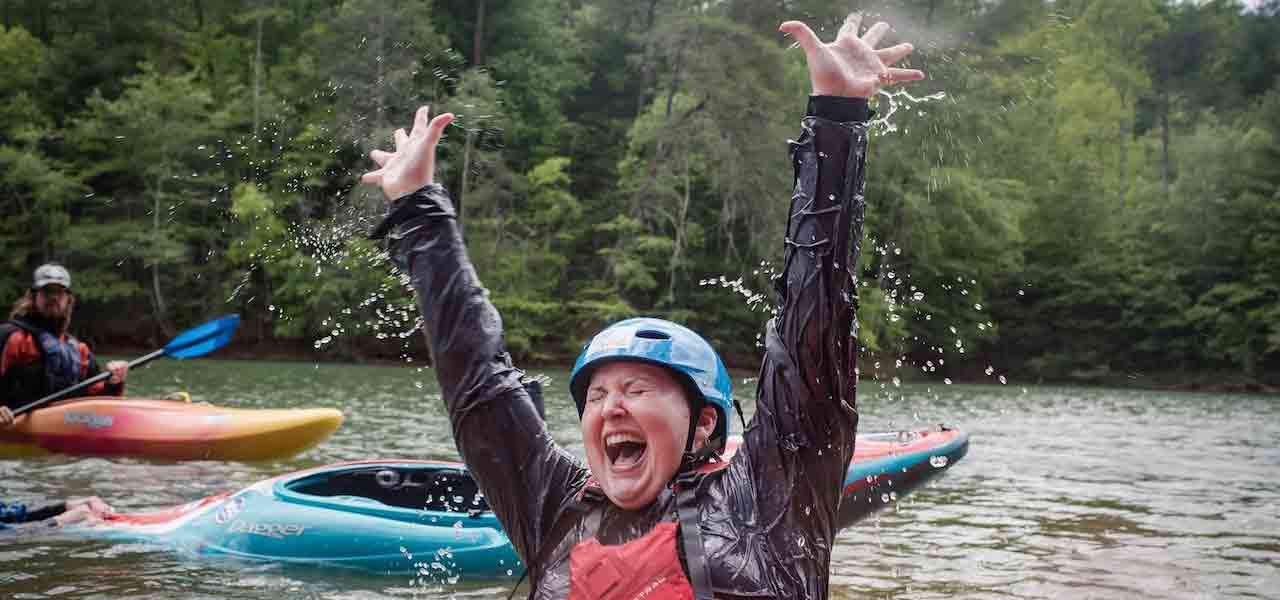At any age, a cancer diagnosis is life-changing. Hearing a doctor say that “big C” word to you or someone you love brings a flood of questions and fears. For young adults in their 20s and 30s, cancer brings a unique set of circumstances, and often life after treatment often looks nothing like the life they had imagined for themselves. Intertwined with gratitude and joy over their survival are also very commonly depression, anxiety, and hopelessness. The season of life that their peers spent developing careers, getting married, or having children of their own was instead spent fighting for their lives in hospitals and treatment centers. Adulthood feels like a false start, and many are left wondering: What now? First Descents helps with the next steps to a fresh start through outdoor adventure experiences.
What is First Descents?

First Descents is an organization that provides adventure-based healing programs specifically for young adults ages 18-39 who have had their young lives interrupted by cancer and other serious health conditions. While most participants have completed cancer treatment before attending a First Descents experience, some are still in treatment or living with a chronic condition.
The term “first descent” comes from whitewater kayaking, referring to the first time someone kayaks a specific rapid or section of a river. This person takes the risk of exploring uncharted territory and blazes a trail for others to come along later. It is an apt metaphor for First Descents participants as they take on the challenge of a new adventure, never knowing what’s around the next turn.
How it all started

Like so many other charitable organizations, First Descents was born out of personal experience. Founder Brad Ludden was a professional kayaker. When his aunt was diagnosed with cancer in her 30s, he saw her struggles firsthand. He also saw how powerful an impact it had when he took her out in a kayak for a few hours. Getting outside and doing something that made her feel alive became an important part of her treatment and recovery. Ludden seemed to instinctively realize that he had stumbled onto something that could help other young adults as well.
Brad Ludden started First Descents when he was just 18 years old. As a professional kayaker and sponsored athlete, Ludden made it a condition of his sponsorship to fund the first trip, taking 15 participants on a weeklong kayaking experience. Eighteen years later, First Descents has provided adventures in kayaking, rock climbing, surfing, and mountain biking to thousands of participants. In 2019, they will offer 150 different programs to groups across the United States.
Why focus on young adults?

Tens of thousands of young adults are diagnosed with cancer each year in the United States, a diagnosis which brings many unique issues when it comes in this stage of life. Many are just beginning their professional lives or are looking for that first job. They may not have health insurance that adequately covers such extensive treatment. Since they are just getting started in their adult lives, they often have little savings to fall back on and come out of treatment facing significant debt.
Young adults rarely see other patients their age as they go through treatment. They are neither pediatric nor geriatric, but often find themselves sorted into one of those categories by default. This can contribute to the sense of isolation many already feel as they face cancer at a young age. As their peers announce engagements, weddings, births, promotions at work, and first-time homeownership – all the milestones common in this season of life – young adults battling for their lives can feel as though life has already passed them by.
The motto of First Descents is “Out Living It,” which carries a dual meaning. It can refer to survival: they are out-living the cancer that threatened their lives. But it also refers to the courage to get out and start living the life they fought so hard to save. It is not easy to find a new normal once cancer has become part of your story, but First Descents is there to help.
A Typical Week at First Descents

While First Descents offers a variety of single-day workshops and multi-day experiences, their most common programs last one week. Many participants have no experience in a kayak or on a mountain bike, so a week gives them time to learn the basics of a new skill and then test it out in a way that is both appropriate and challenging.
Most participants have finished their treatment and are at some stage of recovery, but even those who are still in treatment are welcome with permission from their doctor. Group size is limited to 15 participants plus lead staff and a chef. There is always a volunteer medical professional on each trip, who is familiar with each participant’s history and needs.
Everyone gets a nickname. In an interview for CNN, Brad Ludden explains why: “(It) is a huge part of our culture. This experience can be a real stake in the sand in their recovery or their life post-diagnosis. It can be one of their greatest victories and a defining experience. This name becomes associated with that experience. It’s the name of them as a kayaker, or a climber, or a surfer. It’s not the name of them as someone with cancer. And so it’s an opportunity for a fresh start.”
All First Descents experiences are offered for free. The financial burdens of a cancer diagnosis, especially on young adults, can be overwhelming. Most wouldn’t be able to participate if there was a cost involved. The staff and volunteers want the week at First Descents to be a vacation. Participants have their meals cooked and cleaned up for them, for example, so they are free to relax and spend time together.
First Descents alumni have expressed that the trip is a welcome escape from environments where they are defined by cancer. Lead staff on each trip have training related to the unique psychosocial needs of the people they are leading, but again and again they have found that the therapeutic effects come from the adventure itself and the support of the group. Alumna Lisa “Wombat” Butch said, “Expecting nothing but a fun trip, I found more than I ever dreamed possible with First Descents. After a week of fun, challenge, laughter, support, and accomplishment, I felt whole again for the first time since cancer.”
The Future of First Descents

First Descents is working to remove the stigma that what they do is additive, but not essential in a young cancer patient’s recovery. Their programs are far more than “cancer camp” but part of a treatment plan that addresses the whole person, including mental health and other side effects of cancer. They are reaching out to create more partnerships with hospitals and other medical centers, encouraging them to “Prescribe Adventure” as a part of an overall treatment plan.
In the future, First Descents will continue to be the global leader in adventure-based healing by expanding its programs to include young adults facing other serious illnesses – including the launch of a pilot program for participants with MS in 2018. It was so successful that the organization plans to gradually roll out more opportunities adapted specifically to the needs of young adults diagnosed with MS. Programs designed for participants with other serious medical conditions may be coming in the future as well.

Get involved!
There are many ways to get involved with First Descents in their exciting and important work. Spreading awareness is important so that the people who need these programs know that it is an option. First Descents is donor-funded, so consider getting involved with a tax-deductible contribution. More information for participants, volunteers, and financial supporters is available at their website: www.firstdescents.org You can also follow them on Instagram or Facebook.








